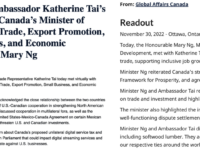Canadian digital law and policy in 2022 was marked by legislative battles over Bills C-11 and C-18, the Rogers outage, stalled privacy and AI reform, copyright term extension, and a growing trade battle with the U.S. over Canadian policies. For this final Law Bytes podcast of 2022, I go solo without a guest to talk about the most significant trends and developments in Canadian digital policy from the past year and to think a bit about what may lie ahead in 2023.
Search Results for "c-18" : 195
The Law Bytes Podcast, Episode 150: How Will Canada Regulate News and Streaming – My Appearance on TVO’s The Agenda
The government’s two big Internet bills – Bill C-11 and Bill C-18, both made significant advances late last week. The Senate Transport and Communications committee concluded months of hearings on Bill C-11 by agreeing to about 25 amendments, notably including a change to the scope of user content regulation that is designed to limit the application to sound recordings as well as the removal of a provision that critics feared would limit CRTC independence. Meanwhile in the House, Bill C-18 cleared the Canadian Heritage committee with changes that invite legal challenges and make a showdown over blocking news content increasingly likely.
Just prior to these committee meetings, I appeared on TVO’s the Agenda with Steve Paikin to discuss the bills and why they matter. The interview elicited very positive feedback and with the kind permission of TVO and the Agenda, I’m pleased to provide the audio version of that interview as this week’s Law Bytes podcast.
Episode 150: How Will Canada Regulate News and Streaming – My Appearance on TVO’s The Agenda
The government’s two big Internet bills – Bill C-11 and Bill C-18, both made significant advances late last week. The Senate Transport and Communications committee concluded months of hearings on Bill C-11 by agreeing to about 25 amendments, notably including a change to the scope of user content regulation that […]
A Tale of Two Readouts: U.S. Escalates Trade Concerns With Canadian Digital Policy as Canada Seeks To Downplay the Issue
Canadian International Trade Minister Mary Ng and U.S. Trade Representative Katherine Tai met yesterday to discuss Canada-U.S. Trade issues and concerns regarding Canada’s digital policy – most notably a proposed digital sales tax and Bills C-11 and C-18 – continue to mount. The U.S. raised digital policy concern over the summer, specifically citing Bill C-11 with a reference to “pending legislation in the Canadian Parliament that could impact digital streaming services.” The latest readout suggests that the concerns are growing, as the U.S. now cites both Bills C-11 and C-18 by raising “pending legislation in the Canadian Parliament that could impact digital streaming services and online news sharing and discriminate against U.S. businesses.”
Dismissing Digital News Outlets: Liberal MP Claims Online News Services Don’t Report News
Since its introduction last spring, online news outlets have expressed fears that Bill C-18, the Online News Act, will primarily benefit large incumbent news organizations. Those concerns grew once the Parliamentary Budget Officer estimated that more than 75% of the revenues would go to broadcasters such as Bell, Rogers, and the CBC. After Postmedia and Torstar collect their share, there may be little left for innovative online startups. The government has seemingly tried to ignore those startups with Canadian Heritage Minister Pablo Rodriguez talking about 400+ news outlet closures since 2008, but neglecting to refer to the hundreds of new outlets that have sprung up during the same period.
During the clause-by-clause review of Bill C-18, Liberal MP Lisa Hepfner, herself a former journalist, provide a stunning illustration of how the government only views incumbent news outlets as worthy of support. Responding to a proposed Conservative amendment to the bill, Hepfner stated:










